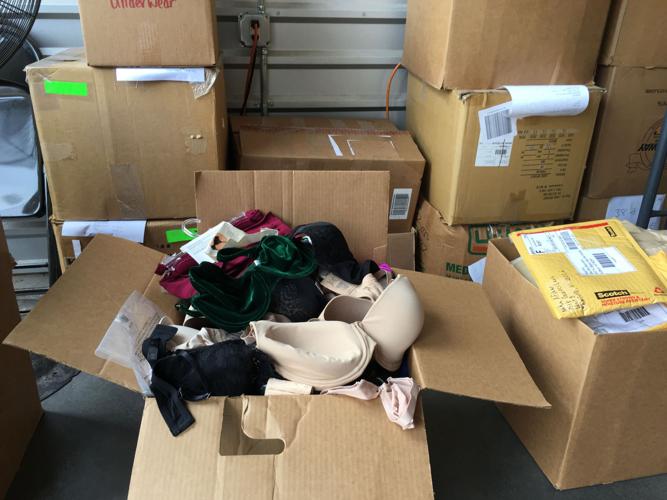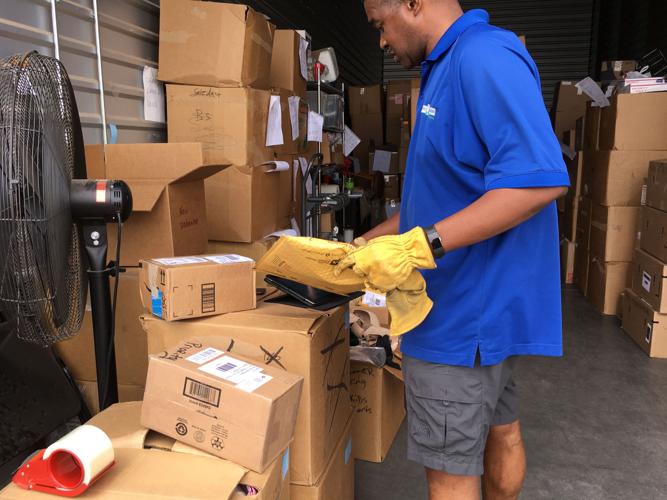GILBERT – Inside a storage facility like any other, a husband and wife are working on a mission unlike any other.
The walls of the storage unit are lined from front to back with cardboard boxes that are filled with bras and other women’s underwear. The towers of boxes create two makeshift and cramped aisles.
Elaine Birks-Mitchell and her husband, Johnny Mitchell Jr., are getting ready to send out their latest shipment on a cloudy day in March, with a strong breeze sweeping through to cool the couple.
The Mitchells make up the backbone of The Bra Recyclers. The business specializes in selling or donating repurposed undergarments. Their inventory consists of bras: all shapes, sizes, styles and colors.
The Bra Recyclers operates by buying large quantities of undergarments and textiles from thrift stores and other groups. The company’s surplus garments are donated to nonprofit organizations all over the country serving people in transition, including foster children, battered women and others in need.
Locally, Helen’s Hope Chest, an organization that primarily helps foster children; the Clothes Cabinet, which helps homeless families; and Moma’s House, an organization serving survivors of domestic violence, are among the groups that work with the Mitchells to provide bras and other undergarments, according to its website.
“As a woman, it’s a big self-esteem booster,” Birks-Mitchell said. “When you don’t have one, you realize how much it means to you when you do have one.”
HELPING HANDS
Until recently the husband and wife team did it all: picking up donations from people, thrift stores and even a Girl Scout troop. Then they sorted, repacked and shipped. Now, the couple needs more people to sort the donated garments.
Epi-Hab Phoenix, Inc. a nonprofit for people with epilepsy and others challenges that make it difficult to work elsewhere, has taken on the task.
The Epi-Hab facility stretches about 30,000 square feet. Several long tables are placed across the main room, with each table as a step in the sorting assembly line.
The process starts with the Mitchells picking up boxes of donations from their P.O. box or their local business partners that collect bras for them, such as Flo’s on 7th, a secondhand store in Phoenix, and Dillard’s. The boxes are scanned to notify donors that their package was received.
Next, the Mitchells hand the donations off to Epi-Hab to sort the bras.
Sorting can stretch the length of the tables, with volunteers looking at different styles of bras on a poster board as a sorting guide for three categories: new, gently used and thrift.
New bras include ones donated with the price tag attached to it. Gently used includes garments that do not have a price tag and are still in good condition. Thrift includes bras that are older and getting worn out but still function.
Johnny Mitchell picks up boxes of the sorted bras from Epi-Hab, drops off new garments to sort, and returns with the boxes to the Mitchells’ storage unit to be sent to organizations in need.
GREATER PURPOSE
The Bra Recyclers have worked since 2009 to provide women with undergarments they cannot afford. The Mitchells hope something as basic as a bra will help ease struggles women face in their lives.
“I think a lot of people don’t think about something as simple as a bra and what an impact it will have on a person’s life,” Birks-Mitchell said.
The Bra Recyclers accept anything they are sent by donors, but unusable garments are sent to small businesses across the country that use bras for other unconventional purposes.
“There is a lady on the East Coast that takes used bras and takes the wire out and she sells the wire,” said Birks-Mitchell. Other groups recycle the fabric for carpets and textiles.





